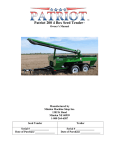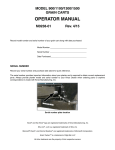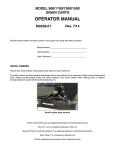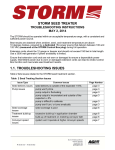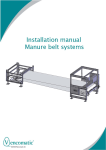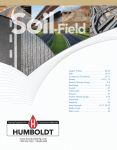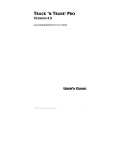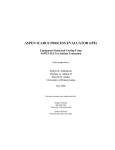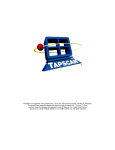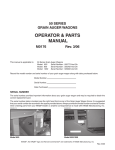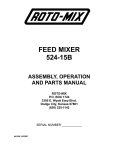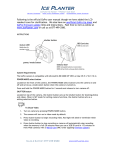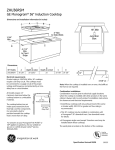Download Owners Manual - Patriot Equipment
Transcript
Patriot 100 2 Box Seed Tender TM Owners Manual Manufactured by Minden Machine Shop Inc. 1302 K Road Minden NE 68959 1-800 264-6587 Seed Tender Trailer Serial # ______________ Date of Purchase _______________ Serial # ______________ Date of Purchase _______________ TABLE OF CONTENTS TABLE OF CONTENTS ............................................................................................................................. 2 SAFETY AND OPERATION RULES ........................................................................................................ 3 GENERAL SAFETY STATEMENTS ........................................................................................... 3 SAFETY ALERT SYMBOL .......................................................................................................... 4 SAFETY PROCEDURES ............................................................................................................... 4 LIGHTING AND MARKING ........................................................................................................ 5 SAFETY OVERVIEW ................................................................................................................... 5 SAFETY AFFIRMATION ............................................................................................................. 6 SIGN OFF SHEET (this must be signed annually as part of your safety program)........................ 7 MACHINE INSPECTION .............................................................................................................. 7 SAFETY DECALS ......................................................................................................................... 7 INTRODUCTION……………….………………………………………………………………..8 LIMITED WARRANTY…………………….……………………………………………...…….9 SAFETY STICKER PLACEMENT……………………..………………………….…………….10 DIMENSIONS CHART ..................................................................................................................................... 12 WIRELESS REPROGRAMMING INSTRUCTIONS .............................................................................. 14 TRAILER WIRING DIAGRAM ............................................................................................................... 19 DESIGNATED WORK AREA ................................................................................................................. 20 WORK AREA DIAGRAM ........................................................................................................... 20 RULES FOR SAFE WORK AREA.............................................................................................. 20 OPERATING PROCEDURES .................................................................................................................. 20 STARTUP AND BREAK-IN PROCEDURES ............................................................................ 20 BULK SEED TENDER INSTALLATION .................................................................................. 20 OPERATING GUIDELINES ....................................................................................................... 21 PRE-OPERATION CHECKLIST................................................................................................. 21 DURING OPERATION ................................................................................................................ 22 OPERATING PROCEDURE ...................................................................................................... 21 SHUTDOWN ................................................................................................................................ 22 LOCKOUT .................................................................................................................................... 23 HIGHWAY AND TRANSPORT OPERATIONS ..................................................................................... 23 LUBRICATION & MAINTENANCE ...................................................................................................... 23 TROUBLE SHOOTING ............................................................................................................................ 24 LOW CAPACITY ......................................................................................................................... 24 AUGER PLUGS ........................................................................................................................... 24 EXCESSIVE AUGER NOISE ...................................................................................................... 24 MOTOR DOES NOT START ...................................................................................................... 25 MOTOR VIBRATES ROUGHLY AT TOP SPEED ................................................................... 25 AUGER DOES NOT TURN......................................................................................................... 25 OPERATING & ADJUSTMENT OF VARIABLE SPEED THROTTLE ACTUATOR ......................... 25 BEFORE STARTING THE ENGINE .......................................................................................... 25 AFTER STARTING THE ENGINE ............................................................................................. 25 TROUBLE SHOOTING THROTTLE CONTROL...................................................................... 26 GENERAL TRAILER MAINTENANCE ................................................................................................. 26 BRAKE ADJUSTMENT .............................................................................................................. 26 BRAKE CLEANING AND INSPECTION .................................................................................. 27 SEED TREATMENT GUIDE ................................................................................................................... 30 2 Sept 12 v7 SAFETY AND OPERATION RULES GENERAL SAFETY STATEMENTS Safety precautions are essential when the use of any mechanical equipment is involved. These precautions are necessary when using, storing, and servicing mechanical equipment. Using this equipment with the respect and caution demanded will considerably lessen the possibilities of personal injury. If safety precautions are overlooked or ignored, personal injury or property damage may occur. This unit was designed for specific applications. It should not be modified and/or used for any application other than which it was designed. If there are any questions regarding its application, write or call. Do not use this unit until you have been advised. For more information, call 1-800-264-6587. Read this entire manual carefully - know your equipment. Consider the application, limitations, and the potential hazards specific to your unit. Occupational safety is of prime concern to us. This manual was written with the safety of the operator and others who come in contact with the equipment as our prime concern. The manual presents some of the day-to-day work problems encountered by the operator and other personnel. We wrote this manual to help you understand safe operating procedures for Patriot Seed Tenders. We want you as our partner in safety. A copy of this manual should be available to all persons who may operate this machine. It is your responsibility as an owner or operator or supervisor, to know what specific requirements, precautions and work hazards exist and to make these known to all other personnel working with the equipment or in the area, so that they too may take any necessary safety precautions that may be required. Avoid any alterations of the equipment. Such alterations may create a dangerous situation where serious injury or death may occur. Why is SAFETY important to you? 3 BIG REASONS 1 2 3 Accidents disable and kill Accidents cost money Accidents can be avoided Signal Words Note the use of the signal words DANGER, WARNING and CAUTION with safety messages. The appropriate signal word for each message has been selected using the following guidelines: DANGER – An immediate and specific hazard, which will result in severe personal injury or death if proper precautions are not taken. WARNING – A specific hazard or unsafe practice, which could result in severe personal injury or death if proper precautions are not taken. CAUTION – Unsafe practices which could result in personal injury if proper precautions are not taken, or a reminder of good safety practices. Sept 12 v7 3 SAFETY ALERT SYMBOL BE ALERT! YOUR SAFETY IS INVOLVED The Symbol Shown Above Is Used To Call Your Attention To Instructions Concerning Your Personal Safety. Watch This Symbol - It Points Out Important Safety Precautions. It Means ATTENTION! Become Alert! Your Personal Safety Is Involved! Read The Message That Follows And Be Alert To The Possibility Of Personal Injury Or Death. Anyone who will operate or work around a Seed Tender shall first read this manual! This manual must be delivered with the equipment to its owner. Failure to read this manual and its safety instructions is a misuse of equipment. SAFETY EQUIPMENT Please, remember safety equipment provides important protection for persons around an auger that is in operation. Be sure ALL safety shields and protective devices are installed and properly maintained. If you find any shields or guards damaged or missing, contact Minden Machine Shop Inc. for the correct items. SERIAL NUMBER To ensure efficient and prompt service, please furnish us with the model and serial number of your Patriot Seed Tender in all correspondence or other contact. The Serial Number is located inside the front leg above the battery box. SAFETY PROCEDURES 1. Use only lifting equipment with the proper capacity when loading or lifting bulk bags or lifting the Patriot Seed Tender. Forklifts with too little capacity may tip towards the front where the lifted weight is. 2. Do not use makeshift systems to handle seed or equipment as you may create an unsafe condition. 3. Do not attempt to raise the Patriot Seed Tender unit by hoist or forklift when it is loaded with product. 4. When the Patriot Seed Tender is mounted in pickup box it must be secured by bolting to bed or chained into all 4 corners. Carrying it loose could cause an accident. 5. Do not unhook your Patriot Seed Tender Trailer while it is full. Any incline or additional weight placed on the back could tip it over backwards. 6. When bulk boxes are placed on the Patriot Seed Tender a danger exists. Hydraulics could fail or operator could make an error causing your arm to be pinned. Do not place a hand or arm into such a position that you may become trapped and crush your arm. 7. Do not operate unit without safety shields or guards in place. 4 Sept 12 v7 8. Do not allow any riders on the Patriot Seed Tender. 9. Do not place flammable objects close to engine. This could cause a fire. 10. Never run engine in an enclosed area. As the exhaust is poisonous. 11. Avoid contact with the muffler. It becomes very hot during operation and remains hot for some time after the engine is turned off. 12. Refuel in a well-vented area with the engine turned off. Do not smoke or allow flames close to the refueling area. 13. Do not overfill gas tank and make sure the cap is properly closed. 14. In case of any defect or awareness of potential danger, please contact the plant at 1-800-264-6587 immediately. LIGHTING AND MARKING It is the responsibility of the customer to know the lighting and marking requirements of the local highway authorities and to install and maintain the equipment to provide compliance with the regulations. Add extra lights when transporting at night or during periods of limited visibility. OPERATOR QUALIFICATIONS Operation of this Seed Tender shall be limited to competent and experienced persons. In addition anyone who will operate or work around a Seed Tender must use good common sense. In order to be qualified, they must also know and meet all other requirements, such as: 1. Some regulations specify that no one under the age of 18 may operate power machinery. This includes Seed Tenders. It is your responsibility to know what these regulations are in your own area or situation. 2. Current OSHA regulations state in part: “At the time of initial assignment and at least annually thereafter, the employer shall instruct every employee or user in the safe operation and servicing of all equipment with which the employee or user is, or will be involved.” 3. Unqualified persons are to stay out of the work area as shown in the work diagrams. 4. A person who has not read and understood all operating and safety instruction is not qualified to operate the machine. SAFETY OVERVIEW YOU are responsible for SAFE operation and maintenance of your Patriot Seed Tender. YOU must ensure that you and anyone who is going to operate, maintain, or work around the seed tender must be familiar with the operating, maintenance, and safety information contained in the manual. This manual will take you step by step through your working day and alerts you to all good safety practices while operating the tender. Remember YOU are the key to safety. GOOD PRACTICES protect not only you but also the people around you. Make these practices a working part of your safety program. Be certain EVERYONE operating this machine is familiar with the procedures recommended and follows safety precautions. Sept 12 v7 5 Remember, most accidents can be prevented. Do not risk injury or death by ignoring any information addressed. Tender owners must give operating instructions to operators before allowing them to operate the tender. They must be reviewed at least annually thereafter per OSHA regulation 1928.57. The most important safety device on the equipment is a SAFE OPERATOR. It is the operator’s responsibility to read and understand ALL instructions in the manual and to follow them. All accidents can be avoided! Any person who has not read and understood all operation and safety instructions is not qualified to operate the seed tender. An untrained operator exposes himself and bystanders to possible serious injury or death. Do not modify the equipment in any way. Unauthorized modifications may impair the functions and/or safety and could affect the life of the equipment. SAFETY AFFIRMATION I have read and understand the operator’s manual and all safety signs before operation, maintenance, adjusting or unplugging the tender. I will allow only trained persons to operate the Patriot Seed Tender. *An untrained operator is not qualified to operate this equipment. I have access to a fire extinguisher. I have all guards in place and will not operate the Patriot Seed Tender without them. I will not allow riders on the Patriot Seed Tender. I understand the danger of moving parts (PTO, auger flighting, and pinch points) and will stop engine before servicing. I recognize the danger of the auger coming in contact with power lines. I will unload the rear compartment first on two-compartment Patriot Seed Tenders. I am aware of the need to secure the Patriot Seed Tender to its base, (truck box or trailer floor). I understand the danger of working with bulk bags as they are placed over the Patriot Seed Tender. I understand that any accidents that occur with the Patriot Seed Tender are my responsibilities. I understand that Minden Machine Shop will not be held responsible of any accidents that involve the Patriot Seed Tender. 6 Sept 12 v7 SIGN OFF SHEET (this must be signed annually as part of your safety program) As a requirement of OSHA it is necessary for the employer to train the employee in the safe operation and safety procedures with this Seed Tender. We include this sign off sheet for you convenience and personal record keeping. DATE EMPLOYER SIGNATURE EMPLOYEE SIGNATURE MACHINE INSPECTION After delivery of your new Seed Tender and/or completion of assembly, before each use, inspection of the machine is mandatory. This inspection should include, but not be limited to: 1. Check to see that all guards are in place, secured and functional. 2. Are all fasteners tight? 3. Check oil levels in the Engine, clutch and auger gearbox. (See Owners Manuals.) SAFETY DECALS 1. Keep safety decals clear and legible at all times. 2. Replace decals and signs that are missing or have become unreadable. 3. Safety signs are available from your Dealer or the Manufacture. How to install Safety Signs 1. Be sure that the installation area is clean and dry. 2. Decide on the exact position before you remove the backing paper. 3. Align the decal over the specified area and carefully press the small portion with the exposed sticky backing in place. 4. Slowly peel back the remaining paper and carefully smooth the remaining portion of the decal in place. 5. Small air pockets can be pierced with a pin and smoothed out using a piece of decal backing paper. Sept 12 v7 7 INTRODUCTION Model: 100 Seed Tender Purpose: The Patriot Seed Tender serves as a bulk transfer system for seed and other dry flowable products. It allows the user to move his product from point A to point B via the Patriot Seed Tender on a trailer. This process accelerates delivery and handling time. For example: a mini bulk box weighing from 1000 to 3000 lbs, can be loaded onto the Patriot Seed Tender in seconds. The Patriot Seed Tender with 2 boxes loaded, for example, is transferred to the field/site where the drill/planter is located. The user parks beside the planter/drill and moves the telescopic movable spout about the target. The tender uses a poly cupped auger powered by a gas motor with a clutch system. The auger is activated by the switch located at the end of the telescopic spout or near the motor depending on what your application is. Features: 1. Deck – Designed for flow-ability in cone and proper angle of repose on top. All Patriot Seed Tenders are sized to compliment bulk boxes used in bulk handling. 2. Easy to use lock downs for bulk boxes. 3. Transfer auger – The poly cupped auger delivers 400 lbs per minute and is very gentle on seed. 4. Telescopic spout – The 3-tier model allows extension of nearly 17 ft. reach, with 15 ft. lateral reach. 5. Throttle/Clutch control – The switch located at the end of the telescopic spout controls the variable speed actuator. It controls flow and stops and activates the flow without motor shutdown. 6. Shut off gate – The feature allows you to choose which hopper you want to empty and handle different varieties of seed on the same load. Thank you for choosing the Patriot Seed Tender delivery system. This manual covers the operation and maintenance of the Patriot Seed Tender. All information in this manual is based on the latest production information available at the time of printing. For the latest version of this catalog please call 1-800-264-6587. Minden Machine Shop Inc. reserves the right to make changes at any time without notice and without incurring any obligation. Please become familiar with all safety, operating, maintenance and troubleshooting information. This will ensure your safety and long life for the system. 8 Sept 12 v7 MINDEN MACHINE SHOP INC LIMITED WARRANTY Minden Machine Shop Inc warrants all products manufactured by it to be free of defect in material and workmanship for a period of one (1) year from the date of purchase. This Minden Machine Shop Inc. warranty does not cover: 1. 2. 3. 4. 5. 6. Parts and accessories supplied by Minden Machine Shop Inc. but manufactured by others. Minden Machine Shop Inc. will facilitate the other manufacturer warranty for the benefit of the purchaser but will not be bound thereby (example: augers, motors, trailers, inoculation tanks, etc.). Products that have been altered by anyone other than a Minden Machine Shop Inc. employee or are used by the purchaser, for purposes other than what was intended at time of manufacture or used in excess of the “built specifications”. Products that are custom manufactured by Minden Machine Shop Inc. utilizing the purchaser’s design which deviates from Minden Machine Shop Inc. normal production line manufactured or customized features of the products. Malfunctions or damages to the product from misuse, negligence, customer alteration, accidents or product abuse due to incoming material or poor material flow ability or lack of required performance or required maintenance (e.g., poor material flow ability caused by incoming wet fertilizer or hot soybean meal, etc). Loss of time, inconvenience, loss of material, down time or any other consequential damage. Product use for a function that is different than designed intent (e.g., storing soybean meal in grain bin, unacceptable material in the bin such as hot bean meal when product originally designed for other application, etc). To activate this warranty, the purchaser must make contact in writing with Minden Machine Shop Inc. within one (1) year of date of purchase. After contact, Minden Machine Shop Inc. has the right to determine the cause and qualify the legitimacy of the claim. Minden Machine Shop Inc., upon acceptance of a warranty claim, shall have a reasonable time to plan any repair or replacement and may affect repair or replacement out of its factory or through contract with a local repair service. If a purchaser after warranty notice is made, chooses to make the repair itself, Minden Machine Shop Inc. must approve any expenses before they are incurred to be responsible for customer reimbursement. Minden Machine Shop Inc. shall be liable on a warranty claim for repair or replacement of any defective products and this is the purchaser’s sole and exclusive remedy. Minden Machine Shop Inc. will not be liable for any other or further remedy including claims for personal injury, property damage or consequential damage. The law of the Sate of Nebraska shall govern and any such claim and any issues with regard to the same shall be resolved in the Nebraska District Court for the county of Kearney. RETURN OF MERCHANDISE Merchandise may not be returned without written approval from the factory. All returns must have a return authorization number. Obtain this number before the return and show it on all return items. A 15% restocking charge is made on merchandise returned. Returned merchandise must be shipped pre-paid. RECEIVING MERCHANDISE AND FILING CLAIMS When receiving merchandise it is important to check both the number of parts and their description with packing slip. The consignee must make all claims for freight damage or shortage within 10 days from the date of delivery. When the material leaves the factory it becomes the property of the consignee. It is the responsibility of the consignee to file a claim on any possible damage or loss. Please list your preferred routing on purchase orders. MODIFICATIONS It is the policy of Minden Machine Shop Inc. to improve its products whenever possible and practical to do so. We reserve the right to make changes, improvements and modifications at any time without incurring the obligation to make such changes, improvements and modifications on any equipment sold previously Sept 12 v7 9 1 2 3 4 7 10 5 6 8 9/13/14 11 12 Sept 12 v7 11 ITEM 1 2 3 4 5 6 7 8 9 QTY 1 1 1 1 1 1 1 1 1 10 11 12 13 14 1 1 1 1 1 Parts List PART # DESCRIPTION C1 Caution Overhang Overhang Caution Sticker C2 Caution General General Caution Sticker D1 Danger Electrical Lines Electrical Lines Danger Sticker Serial Number Serial Number Sticker C4 Rotating Driveline Rotating Driveline Danger Sticker Danger Rotating Auger Rotating Auger Sticker W3 Warning Pinch Point Pinch Point Warning Sticker Warning Pinch Point Pinch Point Warning Sticker PPT1155/ PPT1155-1 White/ Red Patriot Logo Sticker 5” X 20” N2 Check List Checklist Sticker W1 Warning Trailer Warning Trailer Sticker N1 Notice Seed Tender Notice Seed Tender Sticker Patriot Logo 2” X 8” Patriot Logo Sticker Patriot Logo 2” X 8” Patriot Logo Sticker DIMENSIONS CHART Patriot 100 Dimensions TIRE SAFETY 1. Failure to follow proper procedures when mounting a tire on a wheel or rim can produce an explosion which may result in serious injury or death. 2. Do not attempt to mount a tire unless you have the proper equipment and experience to do the job 3. Inflating or servicing tires can be dangerous. Whenever possible, trained personnel should be called to service and/ or mount tires. 4. Always order and install tires and wheels with appropriate capacity to meet or exceed the anticipated weight to be placed on the equipment. TRANSPORTING SEED TENDER Do not transport Seed Tender at speeds in excess of 50 MPH and comply with your state and local regulations governing marking, towing and maximum width. Observe safe driving and operation practices. DANGER: DANGER: Be alert to overhead obstructions and electrical wires. Failure to do so may result in electrocution. Always lower the auger into the stowed position before moving. Maintain at least ten (10) feet of clearance. See above chart showing the height of the auger in the up position. Check the chart to determine the height of you auger. Make certain everyone is clear of the work area before moving. Sept 12 v7 13 WIRELESS REPROGRAMMING INSTRUCTIONS MINDEN MACHINE – Each wireless remote system consists of a transmitter handset and receiver unit. Other standard-equipped accessories include transmitter waist belt, spare transmitter power key, clear vinyl pouch, “AA” alkaline batteries, compass direction decal sheet and user’s manual. WARNING!!!! THE OPERATOR SHOULD NOT ATTEMPT TO REPAIR ANY RADIO CONTROLLER. IF ANY PRODUCT PERFORMANCE OR SAFETY CONCERNS ARE OBSERVED, THE EQUIPMENT SHOULD IMMEDIATELY BE TAKEN OUT OF SERVICE. DAMAGED AND INOPERABLE RADIO CONTROLLER EQUIPMENT SHOULD BE RETURNED TO PATRIOT EQUIPMENT FOR EVALUATION AND REPAIR. FAILURE TO FOLLOW THIS WARNING COULD RESULT IN DAMAGE TO EQUIPMENT. Transmitter switches should never be mechanically blocked ON or OFF. When not in use, the operator should turn the transmitter OFF. A secure storage space should be provided for the transmitter unit, and the transmitter unit should always be placed there when not in use. 14 Sept 12 v7 1. Emergency Stop Button 2. Removable Power Switch Key 3. Push Button #2 4. Push Button # 4 5. Push Button # 1 6. Push Button #3 7. Strap Ring 8. System Information 9. System Channel 10. Crane Number 11. Battery Cover 12. FCC Information Sept 12 v7 15 1. 2. 3. 4. 5. 6. 7. 16 External Antenna Jack Power LED Display Status LED Display SQ LED Display COM LED Display Output Contact Diagram Cord Grip Sept 12 v7 General Operating Procedure Electric Start: If you have the electric start option on your seed tender, then follow the below instructions, a. through d. You can start your motor by rotating the power key to the “Start Position.” Manual Start: If you have a pull start motor on your seed tender, you will need to put the choke lever all the way to the left , then follow the instructions a. through d. a. You will not need to turn the key to start it. Simply place turn the toggle switch attached to the outside of the leg nearest the motor to the on position, put the choke lever all the way to the left in the start position. Reset the red emergency stop button located on the top left hand side of the transmitter handset by rotating it either clockwise or counter clockwise. The red button will pop up. b. Turn on the transmitter power by inserting the black-colored key into the power key slot located on the top right hand side of the transmitter handset and rotate it clockwise to “On” position. c. After turning on the transmitter power, check the Status LED on the transmitter handset for any sign of system irregularities (refer to “Status Light Indicators & Warnings” on page 27). If the system is normal the Status LED will light up green for two (2) seconds. d. If there are no signs of any system irregularities, then rotate the power key further clockwise to “Start” position for up to 2 seconds. This will activate the receiver MAIN (depends on JP3 setting on page 19). Thereafter, the same “Start” position will become an auxiliary function outputted via K26 FUNCTION output relay (wire #5). Sept 12 v7 17 MINDEN MACHINE – Dual Function System Operational Parameters (PN: RE3-MMDM) This system has a dual momentary configuration; the two outputs (White and Gray wires) are controlled through operation of the remote. The control button configuration on the MINDEN MACHINE RE3-MMDM is as follows: The wiring harness has four wires coming out of the RF receiver unit. The plug pin-out and wire colors are as follows: Pin 1 – Yellow - Power Lead (+12V IN) Pin 5 – White – Output (+12V – momentary - while button 1 is depressed) Pin 7 – Black – Ground Lead (connect to ground) Pin 8 – Gray – Output (+12V – momentary - while button 1 is depressed) Key Fob Transmitter Unit Receiver LED Window RE3 Wire Harness 18 Signal Transmission LED Sept 12 v7 TRAILER WIRING DIAGRAM Sept 12 v7 19 DESIGNATED WORK AREA WORK AREA DIAGRAM Before starting the Seed Tender, a designated work area should be established. The work area should be a perimeter in which no persons should be allowed that are not directly involved the operation of the Seed Tender. Also all persons in the work area must have read and understand this manual. RULES FOR SAFE WORK AREA Under no circumstances should persons not involved in the operation be allowed to trespass into the work area. It shall be the duty of all operators to see that children and/or other persons stay out of the work area! Trespass into the work area by anyone not involved in the actual operation, or trespass into hazard area by anyone, shall result in immediate shut down by the operator. It shall be the responsibility of all operators to see that the work area has secure footing, is clean and free of all debris, and tools, which might cause tripping and/or falling. It shall also be their responsibility to keep the work area clean and orderly during the operation. OPERATING PROCEDURES STARTUP AND BREAK-IN PROCEDURES It is essential to inspect your drive line before adding power and know how to shut down in an emergency. During the operation of your auger, one person shall be in a position to monitor the operation. Any auger when it is new or after it sets idle for a season should go through a “break-in” period. The auger should be run at partial capacity until several bushels of grain have been augered to polish the flighting assembly and tube. When the screw and the tube are polished and smooth the auger can be run full. Never operate the auger empty for any length of time, as excessive wear will result. CAUTION: During the initial startup and break-in period, the operator shall be aware of any unusual vibrations or noises that would indicate a need for service or repair. Keep all safety shields and devices in place. Keep hands, feet and clothing away from moving parts. The operator should have a full view of the work area and check that all personnel are clear of designated work area before adding power. SHUT OFF POWER AND LOCKOUT DRIVE TO ADJUST, SERVICE OR CLEAN. BULK SEED TENDER INSTALLATION Caution! **Because the center of gravity is much higher with a loaded tender on a truck bed, much care should be taken in the way the truck is driven and parked. **If the tender is to be used in hilly country, do not unhitch a load or partial load as it could roll away and cause it to flip. 20 Sept 12 v7 The unit should sit evenly and squarely on the bed of the truck or trailer. It may be necessary to also block the base to keep it from moving around. When transporting, keep in mind the auger extends forward, be aware of objects two tall in the towing vehicle. Use caution when passing oncoming traffic or going near obstructions like wires or doors. OPERATING GUIDELINES The Patriot Seed Tender is designed to safely and efficiently transport bulk seed to the field to be filled into your planter or drill. Following all safety and operating guidelines should ensure many years of safe and affordable use. PRE-OPERATION CHECKLIST When operating this unit for the first time and each time you use it, the following information should be reviewed. 1. Make sure the unit is secured to a base and will not slide or roll off. 2. Make sure lids are properly latched 3. Make sure boxes are secured to the tender and the safety latches are in place. 4. Make sure the shields are properly installed. 5. Make sure the auger is secure before transporting. 6. Make sure the throttle cable is free from tangles. 7. Make sure you understand the operation of the gas engine. 8. Carefully study and understand this manual. 9. Do not wear loose-fitting clothing which may catch in moving parts. 10. Always wear protective clothing and substantial shoes. 11. It is recommended that suitable protective hearing and (eye protection) sight protectors be worn. 12. The operator may come in contact with certain materials which may require specific safety equipment, relative to the handling of such materials (examples: extremely dusty, molds, fungus, bulk fertilizers, etc.). 13. Keep wheel lug nuts or bolts tightened to specified torque. 14. Assure that the tires are inflated evenly and to the proper PSI. 15. Give the unit a visual inspection for any loose bolts, worn part or cracked welds, and make necessary repairs. Follow the maintenance safety instructions included in this manual. 16. Be sure there are no tools lying on or in the equipment. 17. Do not use the unit until you are sure that the area is clear, especially children and animals. 18. Because it is possible that this equipment may be used in dry areas or in the presence of combustibles, special precautions should be taken to prevent fires and firefighting equipment should be readily available. 19. Don’t hurry the learning process or take the unit for granted. Ease into it and become familiar with your new equipment. 20. Practice operation of your seed tender and its attachments. Completely familiarize yourself and other operators with its operation before using. 21. Do not allow anyone to stand between the tongue or hitch and the towing vehicle when backing up to the equipment. 22. Securely attach the unit to the towing vehicle using the appropriate ball with the proper rating and always use safety chains. Sept 12 v7 21 DURING OPERATION 1. Beware of bystanders, PARTICULARLY CHILDREN! Always look around to make sure it is safe to start the engine of the unit or the towing vehicle to move the seed tender. 2. NO PASSENGERS ALLOWED- Do not carry passengers anywhere on, or in, the equipment. 3. Keep hands and clothing clear of moving parts. 4. Do not clean, lubricate, or adjust your seed tender while the motor is running. 5. When halting operation, even periodically, set the towing vehicles breaks, disengage the PTO and shut off the engine, and remove the ignition key. 6. Be especially observant of the operating area and terrain – look for holes, rocks or other object that may cause you to trip and fall. Always inspect area prior to operation. 7. Pick the levelest possible route when transporting across fields. Avoid the edges of ditches or gullies and steep hillside. 8. Maneuver the Seed Tender at safe speeds. 9. Avoid overhead wires or other obstacles. Contact with overhead lines could cause serious injury or death. 10. Allow for the units length when making turns. 11. Do not walk under or work on raised components or attachment unless securely positioned and blocked. 12. Keep all bystanders, pets and livestock clear of the work area. 13. Never leave running equipment unattended. 14. As a precaution, always recheck the hardware on the equipment following every 100 hours of operation. Correct all problems. Follow the maintenance safety procedures. OPERATING PROCEDURE 1. 2. 3. 4. 5. 6. 7. 8. Start motor (see motor manual) Throttle/Clutch control should be in neutral. Move telescopic spout above target. Activate auger by pushing the up arrow button on the keyfob at the end of the spout. This in turn will cause the gas motor to increase in speed engaging the centrifugal clutch attached to the motor. When the desired RPM has been attained let go of the green button. Before container is completely filled, return engine to idle by pressing the down arrow button on the keyfob until the auger stops turning, as some product may be in spout. Move to next target and repeat process. When finished empty auger on last box, shut of engine and latch auger. Put fuel lever in “off “ position prior to transporting the unit. SHUTDOWN A. NORMAL SHUTDOWN When shutting down the auger to ready for transportation, make certain that the hopper and auger are empty before stopping the unit. Before folding the auger, the power source needs to be turned off. B: EMERGENCY SHUTDOWN If something happens that would cause a need for an emergency shutdown disengage the auger by slowing the motor to an idle by pressing the red switch at the end of the spout. If for some reason this does not work immediately turn the engine off. Investigate and determine the problem making sure not to put you or anyone in danger. Fix the problem and go through the startup and break-in procedure again. 22 Sept 12 v7 LOCKOUT The auger must be stopped and the power source turned off if the operator must leave the work area or whenever servicing or adjusting. Precaution should be made to prevent anyone from operating the auger when the operator is absent from the work area or inside the tender. Never operate the auger with the top auger not folded up or the cleanout door open. HIGHWAY AND TRANSPORT OPERATIONS 1. 2. 3. 4. 5. 6. 7. 8. 9. 10. 11. 12. 13. 14. Always drive at a safe speed relative to local conditions and ensure that hour speed is low enough for an emergency stop to be safe and secure. Keep speed to a minimum. Reduce speed prior to turns to avoid the risk of overturning. Avoid sudden uphill turns on steep slopes. Always keep towing vehicle in gear to provide engine braking when going downhill. Do not coast. Do not drink and drive. Comply with state and local laws governing highway safety and movement of farm machinery on public roads. Use approved accessory lighting, flags, and necessary warning devices to protect operators of other vehicles on the highway during daylight and nighttime transport. The use of flashing amber lights is acceptable in most localities. However, some localities prohibit there use. Local laws should be checked for all highway lighting and marking requirements. When driving the equipment on the road or highway under 20 MPH at night or during the day, use flashing amber warning lights and slow moving vehicle (SMV) identification emblem. Plan your route to avoid heavy traffic. Be a safe and courteous driver. Always yield to oncoming traffic in all situations, including narrow bridges, intersections, etc. Be observant of bridge load ratings. Do not cross bridges rated lower than the gross weight at which you are operating. Watch for obstructions overhead and to the side while transporting. Always operate equipment in a position to provide maximum visibility at all times. Make allowances for increased length and weight of the equipment when making turns, stopping the unit, etc. LUBRICATION & MAINTENANCE For economical and efficient operation of your auger maintain regular and correct lubrication. Neglect leads to reduced efficiency, excessive wear and needless down time. 1. 2. WARNING Keep all safety shields and devices in place. Never clean, adjust or lubricate a machine that is in operation. Make sure there is plenty of ventilation. Never operate the engine in an enclosed building. The exhaust fumes may cause asphyxiation. Sept 12 v7 23 3. 4. 5. 6. 7. 8. 9. 10. 11. 12. 13. 14. 15. Always use the proper tools or equipment for the job at hand. Honda engine – refer to manual for information on maintenance products and schedules. Gearbox – refer to manual for information on maintenance products and schedules. Cosmetic – any exposed metal where paint or powder has been chipped, gouged, scratched or worn should be lightly sanded, then primed and painted with good enamel paint. If color is hard to match contact Minden Machine Shop Inc. To prevent stone chips on units being pulled by a truck, you should have a set of mud flaps large enough to remedy possible chipping. Bearings should be examined annually for wear and tear. Replace all shields and guards after servicing and before moving. After servicing, be sure all tools, parts and service equipment are removed. Do not allow grease or oil to build up on any step or platform. Never replace hex bolts with less than grade five bolts unless otherwise specified. Refer to bolt torque chart for head identification markings. Where replacement parts are necessary for periodic maintenance and servicing, genuine factory replacement parts must be used to restore your equipment to original specifications. The manufacturer will not claim responsibility for use of unapproved parts and/or accessories and other damages as a result of their use. If equipment has been altered in any way from original design, the manufacture does not accept any liability for injury or warranty. A fire extinguisher and first aid kit should be kept readily accessible while performing maintenance on this or any equipment. TROUBLE SHOOTING LOW CAPACITY The auger may not be getting enough grain. Check to see the intake has not “bridged over” restricting the flow. The exposed flighting at the auger intake should be covered with grain to achieve maximum capacity. Check auger speed. A slow speed (below recommended speed) will result in low capacity. AUGER PLUGS The auger may be getting too much grain and be “jamming” inside the housing. Reduce the amount of grain being fed into the auger. Is the auger free of any foreign material, such as sacks, tarp corners, etc. A plug of the discharge end will cause an auger plug. EXCESSIVE AUGER NOISE Damage could have occurred to the auger flighting, thus causing noise. Damage usually occurs because of foreign material having been run through the auger. It may be necessary to remove the flighting for inspection. If at any time the auger begins to make excessive noise it could be that the belt may have become loose and may need to be tightened. Failure to do so promptly will cause the belt to fail prematurely. 24 Sept 12 v7 MOTOR DOES NOT START 1. Check gas, old gas will lose octane power. Is your fuel valve on the engine turned on? Check your manual for further advice. 2. The unit may have been moved while the gas was not shut off, resulting in gas leaking into the oil. An oil change should fix this. MOTOR VIBRATES ROUGHLY AT TOP SPEED 1. Motor may be running to fast. See Engine Manual for setting top speed. 2. PTO shaft not properly aligned or attached. AUGER DOES NOT TURN 1. 2. 3. 4. Check the throttle cable attachments for activate clutch. Check for PTO slippage or condition. Check to make sure bearings are not frozen. Make sure auger is properly aligned. OPERATING & ADJUSTMENT OF VARIABLE SPEED THROTTLE ACTUATOR The Throttle controller is simple to operate when you keep these few points in mind. BEFORE STARTING THE ENGINE 1. Always keep the battery fully charged. When storing the unit for an extended period of time such, as over winter, you should remove the battery and store it in a place where it can be trickle charged periodically to keep it on good condition. Note: the battery needs to be charged at the start of the season to ensure that you will not have problems when you are in the field. 2. Check operation of the actuator before starting the engine. To do this press the green and red buttons on the switch and watch the arm move left or right depending on which button is pressed. Make sure that the actuator arm is closest to the motor before starting engine. This will prevent the motor from being at full throttle and discharging product. 3. Make sure that there is no obstruction in the discharge tube. AFTER STARTING THE ENGINE 1. Once the engine is started, let it warm up for a few minutes before operating the actuator. The engine should idle smoothly with the choke in the “off” position, once the engine has warmed up. 2. Press the green button on the switch. 3. The engine should increase in speed, and the auger should begin to operate. 4. To avoid premature wear of the auger, do not operate the unit empty unless cleaning out the auger. 5. To adjust top speed of the engine, adjust the top end RPM screw that the throttle lever comes against when at full throttle. If the motor has a rough bouncy top end RPM screw has been adjusted too much. Turn the top end RPM screw clockwise to get rid of the surging. Sept 12 v7 25 TROUBLE SHOOTING THROTTLE CONTROL 1. Engine does not come up to speed properly when you press the switch. Check the battery to see if it is fully charged. Check electrical connections. Check for any obstruction at the throttle lever. Check that the throttle spring is properly adjusted. If you are at a higher altitude you may have to adjust the carburetor (see engine manual). 2. Nothing happens when you press the switch. Check that the battery is fully charged. Check all wire connections and plugs. Check the switch. IMPORTANT: An auger should be frequently checked and serviced to operate freely. Keep all guards and shields in place. Replace any that are damaged or lost. Our Seed Tenders are well made and we are proud of our line of equipment. We would like you, as our customer, to do your part in using caution and good judgment in using our equipment as well as any other machinery. Any parts needing replacement should be replaced with parts of the same type and size. Do not modify or alter any of the auger components. GENERAL TRAILER MAINTENANCE BRAKE ADJUSTMENT Brakes should be adjusted (1) after the first 200 miles of operation when the brake shoes and drums have “seated,” (2) at 3000 mile intervals, (3) or as use and performance requires. The brakes should be adjusted in the following manner. 1. Jack up trailer and secure on adequate capacity jack stands. Follow trailer manufacturers’ recommendations for lifting and supporting the unit. Check that the wheel and drum rotate freely. 2. Remove the adjusting hole cover from the adjusting slot on the bottom of the brake backing plate. 3. With a screwdriver or standard adjusting tool, rotate the star wheel of the adjuster assembly to expand the brake shoes. Adjust the brake shoes out pressure of the linings against the drum makes the wheel very difficult to turn. Note: With drop spindle axles, a modified adjusting tool with about an 80 degree angle should be used. 4. Then rotate the star wheel in the opposite direction until the wheel turns freely with a slight lining drag. 5. Replace the adjusting hole cover and lower the wheel to the ground. Repeat the above procedure on all brakes. Caution: Never crawl under your trailer unless it is resting on properly placed jack stands. Follow the trailer manufacturers’ recommendations for lifting and supporting the unit. Do not lift or place supports on any part of the suspension system. 26 Sept 12 v7 BRAKE CLEANING AND INSPECTION Your trailer brakes must be inspected and serviced at yearly intervals or more often as use and performance requires. Magnets and shoes must be changed when they become worn or scored, thereby preventing adequate vehicle braking. Clean the backing plate, magnet arm, magnet and brake shoes. Make certain that all the parts removed are replaced in the same brake and drum assembly. Inspect the magnet arm for any loose or worn parts. Check shoe return springs, hold down springs, and adjust springs of stretch or deformation and replace if required. Caution: ASBESTOS DUST HAZARD! Since some brake shoe friction materials contain asbestos, certain precautions need to be taken when servicing brakes: 1. Avoid creating or breathing dust. 2. Avoid machining, filing or grinding the brake linings. 3. Do not use compressed air or dry brushing for cleaning. (Dust can be removed with a damp brush). Sept 12 v7 27 28 Sept 12 v7 Patriot Seed Treater Owners Manual Manufactured by Minden Machine Shop Inc. 1302 K Road Minden NE 68959 1-800-264-6587 Seed Treater Serial # ______________ Date of Purchase _______________ Sept 12 v7 29 YOUR SEED TREATER COMES WITH A METERING DISC THAT WILL HELP REGULATE THE AMOUNT OF INOCULANT YOU WILL BE APPLING TO YOUR SEED. USE THIS GUIDE TO HELP YOU DETERMINE THE PRESSURE YOUR TREATER SHOULD BE RUNNING AT. SEED TREATMENT GUIDE IF YOU NEED THIS OZ PER 50 LBS TOTAL OZ PER MINUTE OF LIQUID AT 400 LB PER MINUTE OF SEED FLOW SET PRESSURE GUAGE AT THIS PSI USING A CP4916-39 1 1.1 1.2 1.3 1.4 1.5 1.6 1.7 1.8 1.9 2 2.1 2.2 2.3 2.4 2.5 8 8.8 9.6 10.4 11.2 12 12.8 13.6 14.4 15.2 16 16.8 17.6 18.4 19.2 20 4.4 5.3 6.3 7.4 8.5 9.8 11.1 12.6 14.1 15.7 17.4 19.2 21.1 23.0 25.1 27.2 This chart is only to be used as a guide line, manual calibration must be done to insure that the bushels per minute from the auger are known exactly and ounces per minute from the treater are known exactly. 2 Box Seed Tender Electric Folding Auger Installation Instructions 1. Start with the auger folded and latched down in the rest. Mount the bottom actuator ears as shown in figure 1 and figure 2. Be sure to notice the ears are marked as to where they go. The inside ear says “2 BOX IN” and the outside ear says “2 BOX OUT.” Also there is a 1.25” long bushing that holds the spacing of the ears. It mounts with a 3/8” x 2.5” bolt. See figure 3. 30 Sept 12 v7 Sept 12 v7 31 32 Sept 12 v7 Sept 12 v7 33 2 Box Seed Tender Electric Folding Auger Installation Instructions 1. Start with the auger folded and latched down in the rest. Mount the bottom actuator ears as shown in figure 1 and figure 2. Be sure to notice the ears are marked as to where they go. The inside ear says “2 BOX IN” and the outside ear says “2 BOX OUT.” Also there is a 1.25” long bushing that holds the spacing of the ears. It mounts with a 3/8” x 2.5” bolt. See figure 3. figure 1 figure 2 figure 3 2. Mount the upper band clamp around the upper auger as shown in figure 2. The edge of the band clamp should be about 7 9/16” from the end of the upper auger tube. Leave it loose for now. 3. Mount the actuator in the ears as in figure 1 and figure 2. Use the ½” bolts and lock nuts. Do not tighten them completely they need to turn freely. 4. Align the actuator mounts with the auger hinge as in figure 4. It is very important the actuator works and pivots parallel to the auger hinge. If not it will bind and cause actuator failure. With the ears aligned tighten the band clamps. 34 Sept 12 v7 figure 4 5. Mount the switch about three quarters up on the front leg using the bracket as a drill pattern. Drill the holes using a ¼” drill bit. See figure 5. figure 5 6. Route the harnesses using the cable hold downs on the body and inside of the leg. Attach the red wire to the positive terminal on the battery and the black to the negative terminal. Plug the connector on the other harness into the actuator. 7. Unlatch the auger hold down at the rest. Press the switch in the up direction and raise the auger. Latch the auger in the up position. The actuator should be slightly loose in the mounts. If not adjust the clamps slightly until the actuator has some slack in both the up and down positions. Be sure to retighten the clamps. Sept 12 v7 35



































